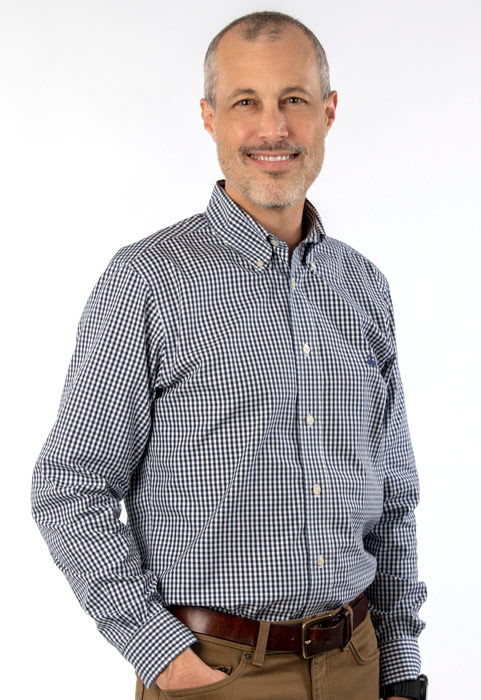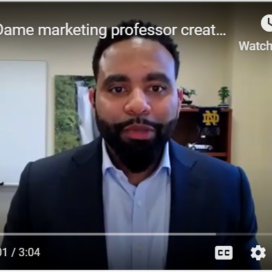Charting the course to your calling
What does it mean to have a “calling”? Notre Dame management researcher Matt Bloom visited hundreds of clergy, doctors, teachers and aid workers in 22 countries to find out.
Published: April 27, 2021 / Author: Brett Beasley
Working from 5 to 9.
You’ve got passion and a vision.
’Cause it’s hustlin’ time, a whole new way to make a living.
Gonna change your life, do something that gives meaning.
With a website that is worthy of your dreaming.
On Feb. 7, 2021, the 96.4 million viewers of Super Bowl LV heard these lyrics ring out in the bright soprano tones of Dolly Parton in an ad for the website hosting company Squarespace. Parton was singing a rendition of her 1980 song “9 to 5” — but this version was flipped to “5 to 9” to celebrate the “passion economy.”
For many, the ad struck a chord. They heard it as an anthem for the world they want to live in; one where, with enough dreaming and hustling (and maybe a website from Squarespace), anyone can do deeply meaningful work.
But for others, you might say that the ad struck a nerve. After all, many have found work draining during the COVID-19 pandemic as work-life balance gave way to work-life blending. Sure, they’d like to do work they find meaningful. But more passion? More hustlin’? Launching a flashy website? They began to ask whether these ideas are fed by dreams or by delusions.

Matt Bloom
Questions like these are familiar to Matt Bloom, a Management & Organization research professor at Mendoza College of Business. He has been asking them ever since the night more than three decades ago when he woke up his wife, Kim, to ask, “What if I went back to graduate school?”
At the time, Bloom was a financial advisor at Shearson Lehman Brothers and had spent 10 years in jobs he found unsatisfying. He ended up launching an academic career after graduate school devoted to studying all that’s behind our answers to the deceptively simple question, “How’s work?”
According to Bloom, our answers to that question have been shifting over the past year. Normally, he says, “the ache we have for meaning becomes dulled by busyness and routine.” However, the pandemic has brought a disruption — a kind of forced sabbatical. People are asking larger questions about what is meaningful, and that includes the question, “How do I find work that really matters to me, and how is that different from just getting a job or having a career?”
Having just completed one of the most ambitious studies of his career, Bloom not only understands where the questions are coming from; he is better equipped to answer them than ever before. Informed by the hundreds of interviews he recently collected, Bloom says we can all improve the way we search for and live into our callings. And we can also avoid some of the most common dead ends and pitfalls people encounter along the way.
FINDING THE CALLED
The inspiration for Bloom’s new project was the contradictory advice we tend to receive about finding a calling. Some of our traditional ideas about callings suggest that they happen to us in a road-to-Damascus type experience. It’s just a matter of waiting patiently and not giving up hope.
Many contemporary sources suggest, on the other hand, that a calling is up to us, that we need to pursue it. Take, for example, Steve Jobs’ famous Stanford commencement address, in which he averred:
You’ve got to find what you love. … Your work is going to fill a large part of your life, and the only way to be truly satisfied is to do what you believe is great work. And the only way to do great work is to love what you do. If you haven’t found it yet, keep looking. Don’t settle. As with all matters of the heart, you’ll know when you find it.
Inspiring as this advice may feel, it also turns out to be impractical. It tells us to keep looking, but it doesn’t tell us how to look or where to start. Seeking a calling begins to feel like searching for the lost city of Atlantis — grasping at hints and guesses in pursuit of something you’re not sure exists.
Bloom decided to attempt something no one had before: to chart the course to a calling. He would do it by finding people who have a calling, who do experience their work as something they were born to do. By recording and analyzing the steps these people took, Bloom hoped he could separate the facts about callings from the fictions.
His task was not as daunting as the quest for Atlantis, but it did prove to be a complex one, with a significant amount of field work and investigation. The first challenge Bloom faced was finding people who have callings. After all, “I have a calling” is not something a professional places on a business card or LinkedIn profile.
Bloom eventually settled upon what you might call the “it takes one to know one” approach. He started asking around to find out if people could identify a person who experiences their work as a calling. After interviewing that person, he would ask for a few other names of those who felt called to the work they do.
This method is a version of what researchers call “snowball sampling,” and chasing the various connections it created took Bloom to 22 countries in all. Although he started the project solo, he later added professors Amy E. Colbert (Iowa) and Jordan D. Nielsen of Purdue University to his team.
Bloom and his two colleagues ended up speaking with 238 different individuals. They focused on professionals from four fields where they thought it was especially likely to find people who felt called to their work. They worked with physicians of several different specialties, clergy from Catholic and Protestant churches, teachers, and international aid workers in Africa, Asia and the Middle East.
Alongside the challenge of finding people with callings, there was another challenge: What data does a researcher collect in order to understand what it means to find and pursue a calling? Bloom and his team wanted to move past platitudes and fuzzy generalities about work and immerse themselves in the lives of the professionals they studied. They realized that what they were looking for could not be captured with a simple survey.
They decided that the best way to get at the lived experience of each professional’s calling was to have the professional tell his or her story — starting as early in life as they needed to and continuing up to the present. Although Bloom was trained as a quantitative researcher — a “number cruncher,” as he puts it — he has found that, “Our stories hold the deeper truths about who we are.” Ask someone to tell a story, he says, and you’ll hear more than, “I like this,” or, “I don’t like that”; you’ll hear about “what it means to do something you really love and what it took for you to find it.”
This commitment to the power of stories and storytelling made the research process a heavy lift for Bloom and his team. They listened to and recorded each story on-site. They wanted to truly attend to the richness of what it meant to have a calling, and they felt it was important to be in the field camp with the aid worker, in the pastor’s study, in the physician’s examination room, and in the teacher’s classroom.
Afterward, the researchers analyzed and coded each story to see if common elements or patterns would appear. The process for each interview took between 10 and 15 hours. For Bloom, it was more profound than ponderous: “It felt like every time we talked to somebody, we were getting this precious gift of their life, their story. So these experiences of being with them were powerfully meaningful to us. There was a sacredness that we felt.”
DISCERNERS AND EXPLORERS
Slowly, as though they were developing a photograph in a darkroom, the chart Bloom and his team had hoped for began to emerge. It became clear that people who felt called to the work that they do tended to follow a set path — or, rather, one of two paths.
The first path Bloom and his team identified is one they called the “Discerner” path. People who followed this path looked for their one true calling the way a person might look for a soulmate. Discerners felt they were destined to find their calling eventually, even if it took them time to “hear” it clearly. They began by gaining a deep understanding of their strengths, weaknesses, passions and values. They also followed the example of someone who had found a calling, and they looked to wise people in their life for advice about where they might be called. Discerners might repeat this process several times before they could finally connect the dots and acknowledge the calling that was there all along.
The other path Bloom and his team identified was that of the “Explorer.” For Explorers, the process of finding a calling was not discernment but discovery. Explorers often tried several different jobs in a restless quest to find “something more.” Explorers made deliberate choices to pursue work they loved, but they were also open to the role of chance. While explorers benefited from care and support from friends and loved ones, they relied less on their example or guidance. Instead, they focused on finding work where they could express their own core convictions.
Bloom says that the best news that emerged from his work was that there is a path you can follow when it comes to finding a calling. But which one?
On the one hand, Explorers tend to be more flexible than Discerners. Explorers might view a job loss, for instance, as their calling evolving into something new. But Discerners might perceive this same scenario as a challenge to their duty to do the work they’ve been called to do. However, Discerners often weather storms better than Explorers. When things get tough, they stick with it because their work is something they are not just something they do. Discerners might be prone to overwork, but they’re also primed for resilience.
While each path comes with its own risks and rewards, Bloom’s own view is that many people gravitate toward the Explorer path when they might be better served by the Discerner path. He uses his own life as an example. “I was an Explorer,” he says. “I stumbled into my calling. I wish I had known what I know now, because there were signs years ago that I didn’t pay attention to. I didn’t pay attention to my love of learning. People would say, ‘Matt, you should be a teacher,’ and I would think, ‘How would they know what I should be?’”
In addition to thinking about which path to follow, we can also learn a lot by recognizing what the two paths share. Regardless of their path, only a few of the professionals in Bloom’s study had ever experienced what he calls a “thunderous calling,” something like hearing a voice or having a dream that reveals one’s calling. For both Discerners and Explorers, a calling did not happen easily or instantaneously.
Even for Discerners, who approached their calling like a search for a soulmate, the process was more like a courtship than like getting struck by Cupid’s arrow. It took time and work with intentional effort along the way. “One of the important things is that you don’t have to wait until the tablets fall from the sky,” he says. “There is a recognizable process to find a calling. But to get started, you have to look for it.”
PASSION PLUS
Bloom’s study also challenges the notion that “if you find a job you love, you’ll never work a day in your life.” For Bloom, this idea trivializes what a calling is really like for the people who have one. “Callings can colonize the rest of your life,” he says. Although they are a deep and vibrant source of meaning and joy for the people who have them, they also inevitably involve some risk and sacrifice. They even appear to make those who have them more prone to burnout, and that is one reason Bloom’s next project will look at ways both Explorers and Discerners can gain perspective and recharge.
Another important discovery concerns the role others play in helping us live into our callings. While a calling is by its nature unique and individual, it is not individualistic. Discerners relied more intensely upon other people in identifying and committing to their calling, but both Explorers and Discerners needed feedback. They looked to students, patients, beneficiaries, parishioners and even their colleagues to affirm their calling.
Similarly, the professionals Bloom studied did not just want to feel good about their work, they also wanted to know they were good at it. “Mastery was more than being good at one’s work,” he says. “It was seen as the right way to live out one’s calling.”
This is one reason that, as Bloom points out, “follow your passion” can be bad advice. He offers as an example a survey-based study of musicians. The study found that musicians who scored extremely high on passion for music were very likely to think they were called to music as a profession. However, those same musicians, the study found, “tended to overlook the fact that they didn’t have the talent.”
Passion matters, but it can often mask other important factors. One seminary dean who participated in the study expressed it this way: “[N]o one is called to mediocrity; we are all called to be excellent.”
Bloom says that people who are beginning to ask questions about their calling (or asking them again after years in the workforce) can draw a few pointers from his work. For those who have the necessary time and resources, Bloom recommends taking a sabbatical — one that allows you to “get out of your current living situation and set aside the identity you had as Matt Bloom the professor or Sue Smith the physician.”
Even those who cannot step away from their current job can make progress toward more meaningful work. Bloom says there’s a simple strategy that starts with just a pen and paper. He recommends writing down stories about work at its best and work at its worst. Writing, said Bloom, “causes you to be more reflective and to ask yourself deeper questions: ‘When did I feel most alive? Why?’” Then Bloom recommends sharing with someone who knows you well and asking, “What are you hearing in my story?” Research shows that the presence of an engaged, attentive listener can help us delve deeper into the richness and meaning of our stories.
In her poem “To Be of Use,” Marge Piercy wrote, “The pitcher cries out for water to carry / and a person for work that is real.” In one sense, you might say that Bloom proved Piercy right: We do cry out for our calling, and meaningful work is really out there for those who go looking.
Fortunately, we can do more than “cry out” — and not necessarily by launching a website, hustlin’, or working around the clock. Instead, we can take gradual steps on the path to purpose-filled work. And with a little help from Matt Bloom’s research, we can see that it’s well-trodden with guides and signposts scattered along the way.
Brett Beasley is the associate director of the Notre Dame Deloitte Center for Ethical Leadership.
“Stories of Calling: How Called Professionals Construct Narrative Identities”
Administrative Science Quarterly (Aug. 17, 2020)
Matt Bloom, Amy E. Colbert, Jordan D. Nielsen
Seeking a calling begins to feel like searching for the lost city of Atlantis — grasping at hints and guesses in pursuit of something you’re not sure exists.
Related Stories




